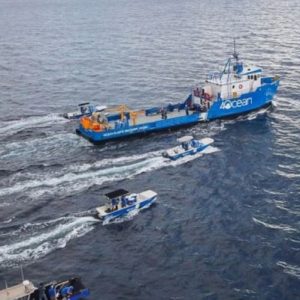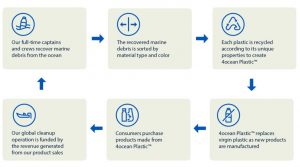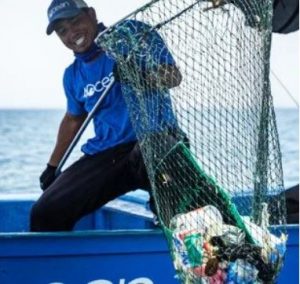By Kali Prescott, MLML Vertebrate Ecology Lab
An estimated 5.25 trillion tons of plastic is currently adrift in the ocean having extensive deleterious effects on wildlife (Erikson et al., 2014). Reduce, reuse, recycle has been the battle cry of environmentalists and ocean clean up organizations since the public first realized the severity of marine plastic pollution. For decades plastic producing companies have touted recycling as the solution to plastic pollution in the ocean while simultaneously shirking responsibility—claiming that recycling “is not economically viable”. Continuing to produce virgin plastic unfortunately remains cheaper than producing products from recycled materials even with technological developments.
As recently as September of this year, National Geographic reporter Laura Parker quoted the American Chemistry Council as stating that reducing virgin plastics is “highly counterproductive and impractical,” and was seconded by both ExxonMobil and Dow. Thus, private or government funded recycling plants are saddled with the costly process of sorting, washing, and repurposing plastic waste. None of this directly addresses the issue of plastic in the ocean or the waste washing on beaches worldwide.

Enter 4Ocean
4Ocean, an organization that hosts and funds beach and coastal water clean ups through community outreach, and the sale of 100% post-consumer recycled products most notably their bracelets. Founded in 2017 by two Floridian Surfers, who saw the extent to which plastic was affecting the beaches they surfed on, 4Ocean now operates in 4 countries (Bali, Haiti, Guatemala, and Florida in the United States).
What is surprising about 4Ocean is not how quickly the organization grew or how many countries it operates in, but the fact that 4Ocean is a privately held, for-profit company operating with the moral imperative and financial model of a nonprofit. 4Ocean accomplishes this by legally registering as a Public Benefit Corporation and obtain a B Corporation certification. To maintain the legal standing as both Benefit Corporation and certified B Corp, 4Ocean must “consider the impact of their decisions on their workers, customers, suppliers, community, and the environment” - B Corp. Additionally, 4Ocean uses a purpose driven business model. The sell of their recycled merchandise serves first and foremost to fund the requisition of vessels, sorting facilities, to the do the one thing many nonprofits struggle to do—pay people to clean up the ocean.

Coming Full Circle
This business model could potentially be a promising solution to the issue of plastic in the ocean. Science Foundation through the University of Maryland’s National Socio-Environmental Synthesis Center (SESYNC) stated that 1 billion people would need to participate in ocean clean ups worldwide to begin to mitigate input of plastic pollution from land sources (Borrelle et al,. 2020). A network of competing coastal cleanup Benefit Corporations could go a long way to meeting that goal while also creating local jobs. An added benefit is that these corporation would create a market of environmentally friendly consumer products and take a lot of the guesswork out of ethical shopping.
Lastly 4Ocean tracks every piece of trash they collect creating an invaluable dataset on coastal plastic waste. If made publicly available, these data sets could help to inform scientists on what plastics are congregating in certain areas, why, and how best to address those findings.
Here at Moss Landing Marine Labs and across California, we participate in Coastal Cleanup Day, but as SESYNC reported, 1/8th of the population would still need to continuously participate in coastal cleanups just to catch up with plastic pollutions along the coast. 4Ocean could be an example for other start up businesses and Moss Landing Alumni to follow, and develop a network of similar organizations along the west coast and other coastal area worldwide. A new industry in coastal trash collections could be one part of the solution to preventing more plastic from entering the ocean, and provide jobs to people living in coastal areas.

References
Eriksen, M., Lebreton, L. C. M., Carson, H. S., Thiel, M., Moore, C. J., Borerro, J. C., … Reisser, J. (2014). Plastic pollution in the world's oceans: More than 5 trillion plastic pieces weighing over 250,000 tons afloat at sea. PLoS One, 9, e111913. https://doi.org/10.1371/journal.pone.0111913
Parker L. Plastic pollution is a huge problem-and it's not too late to fix it. National Geographic. 2020 Oct 6 [accessed 2020 Oct 25]. https://www.nationalgeographic.com/science/2020/10/plastic-pollution-huge-problem-not-too-late-to-fix-it/
The 4ocean Bracelet - Every purchase pulls a pound of plastic from our. 4ocean. [accessed 2020 Oct 27]. https://www.4ocean.com/
Borrelle SB, Ringma J, Law KL, Monnahan CC, Lebreton L, McGivern A, Murphy E, Jambeck J, Leonard GH, Hilleary MA, et al. 2020. Predicted growth in plastic waste exceeds efforts to mitigate plastic pollution. Science (80- ). 369(6510):1515 LP – 1518. doi:10.1126/science.aba3656. http://science.sciencemag.org/content/369/6510/1515.abstract.

